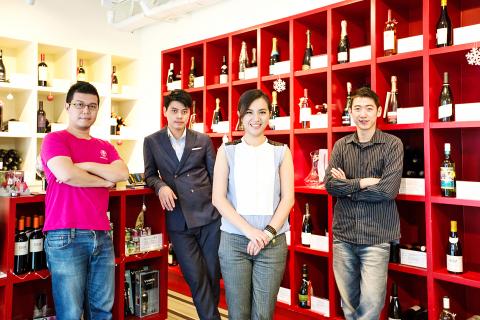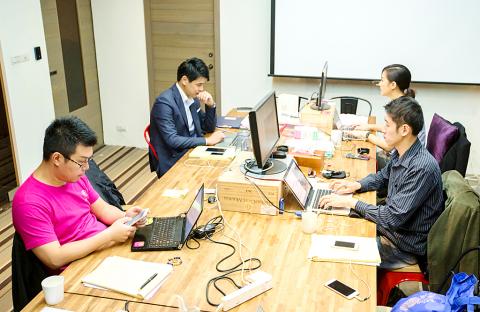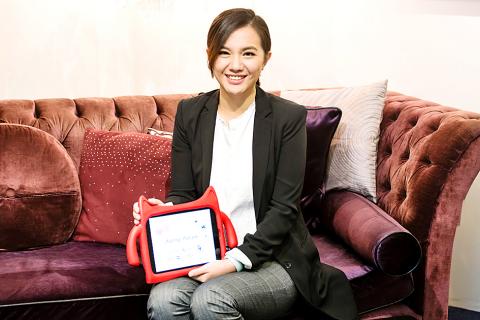“You’re looking for the…wine shop?” The security guard at a residential building asks when I show him the address I had scribbled down on a Post It note.
“Yes, the…wine shop.”
Of course, we both know that we’re talking about the matchmaking service that doubles as a wine shop.

Photo courtesy of AiMatchMaker
When Tilaine Wang (王亭嵐) launched AiMatchMaker in 2015, her idea was to make the service as discrete as possible.
With headquarters in Taipei that provides dating services for premium clients, AiMatchMaker (AiMM) also runs an app that currently has users from 42 countries. As their Facebook page states, they cater to “singles of Chinese descent, language and/or culture around the world.”
The description might have some like myself puzzled but Wang explains that their service is similar to JDate for Jewish singles — to connect people with a similar background, though some might identify with it more strongly than others. She adds that people who use dating apps tend to use more than one at a time, and that they are simply providing people with another option.

Photo courtesy of AiMatchMaker
For those who are used to a quick and easy sign-up process for apps like Tinder or Bumble, AiMM might seem more complex. After creating a profile and filling up a questionnaire, one of the in-house matchmakers in their Taipei headquarters manually approves the user’s profile and users are delivered three matches a day. While Wang and the other matchmakers used to handpick the matches, they now use an algorithm.
“AiMM is for people who share Chinese, or more broadly speaking, Asian values,” Wang says.
Currently, their users hail from a wide demographic, spanning Taiwanese and Chinese, including expats, Asian Americans and Caucasians who were raised in or have lived in Taiwan or Asia for years.

Photo courtesy of AiMatchMaker
DATING APP STIGMA
There are several features that make the app popular among users who share these so-called “Chinese values.”
For instance, confidentiality. Wang explains that it helps to have the wine shop as a cover — though they do also sell wine and Wang is a certified sommelier.
“We’re not like Tinder or Coffee Meets Bagel where you have to sign in through Facebook and see which mutual friends you have in common with a match,” Wang says. “People who come from a Taiwanese or Chinese background might find that embarrassing.”
That was certainly the case for Taipei native Doris Huang (黃嘉欣) who used AiMM to find her current boyfriend, an American-born-Chinese from Chicago.
Huang says that many of her acquaintances still view using dating apps as something “shameful” despite their widespread use and growing popularity.
Another AiMM user, Ellen Lin (林志暄), has a slightly different view.
“There’s not really a stigma these days,” Lin says.
Before signing up for AiMM, Lin thought that dating apps were primarily to find “friends with benefits” — something which she had no interest in. But when found out that her friends had found their current boyfriend or girlfriend on dating apps, she decided to sign up for a few, including AiMM.
Despite the waning stigma of dating apps, Lin says that she is unsure how her parents would react if she had found someone on AiMM as neither of her parents have met any of her former boyfriends before.
“Maybe they just feel shy and wouldn’t know how to begin the conversation,” Lin says.
NO CULTURAL FAUX PAS
Kenneth Wu (吳冠傑), who found his girlfriend, another Taiwanese, on AiMM says that dating someone from the same ethnic background has to do with a sense of familiarity.
“To be born and raised as a Taiwanese, you hardly realize that you belong to an ethnic group until going abroad and talking to people from all over the world,” Wu says.
He adds that his experience living the US made him more aware of his own ethnicity, and that although he’s not opposed to dating women from other countries, in his past experience, it’s been mostly women of Chinese descent who have been attracted to him.
Wu is happy with his current girlfriend and that part of the reason why they are able to communicate effectively is because they share the same ethnic heritage.
“If I say something that’s related to a lyric in a pop song, she will get it immediately,” Wu says. “I don’t think this is possible in a cross-cultural relationship.”
Lin says that she hasn’t put much thought into dating someone from a different ethnic background and that her parents probably don’t think that she would “find a foreign boyfriend.”

On April 26, The Lancet published a letter from two doctors at Taichung-based China Medical University Hospital (CMUH) warning that “Taiwan’s Health Care System is on the Brink of Collapse.” The authors said that “Years of policy inaction and mismanagement of resources have led to the National Health Insurance system operating under unsustainable conditions.” The pushback was immediate. Errors in the paper were quickly identified and publicized, to discredit the authors (the hospital apologized). CNA reported that CMUH said the letter described Taiwan in 2021 as having 62 nurses per 10,000 people, when the correct number was 78 nurses per 10,000

As we live longer, our risk of cognitive impairment is increasing. How can we delay the onset of symptoms? Do we have to give up every indulgence or can small changes make a difference? We asked neurologists for tips on how to keep our brains healthy for life. TAKE CARE OF YOUR HEALTH “All of the sensible things that apply to bodily health apply to brain health,” says Suzanne O’Sullivan, a consultant in neurology at the National Hospital for Neurology and Neurosurgery in London, and the author of The Age of Diagnosis. “When you’re 20, you can get away with absolute

May 5 to May 11 What started out as friction between Taiwanese students at Taichung First High School and a Japanese head cook escalated dramatically over the first two weeks of May 1927. It began on April 30 when the cook’s wife knew that lotus starch used in that night’s dinner had rat feces in it, but failed to inform staff until the meal was already prepared. The students believed that her silence was intentional, and filed a complaint. The school’s Japanese administrators sided with the cook’s family, dismissing the students as troublemakers and clamping down on their freedoms — with

As Donald Trump’s executive order in March led to the shuttering of Voice of America (VOA) — the global broadcaster whose roots date back to the fight against Nazi propaganda — he quickly attracted support from figures not used to aligning themselves with any US administration. Trump had ordered the US Agency for Global Media, the federal agency that funds VOA and other groups promoting independent journalism overseas, to be “eliminated to the maximum extent consistent with applicable law.” The decision suddenly halted programming in 49 languages to more than 425 million people. In Moscow, Margarita Simonyan, the hardline editor-in-chief of the